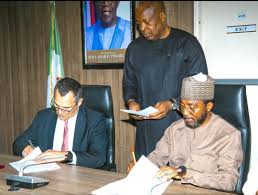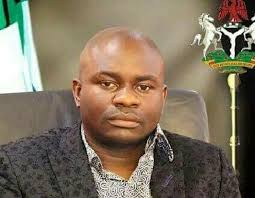News
SERAP, Others Sue Senate Over Plan To Spend N5.5bn On Cars

The Socio-Economic Rights and Accountability Project (SERAP), BudgIT, Enough is Enough (EiE) and 6,721 concerned Nigerians have filed a lawsuit asking the Federal High Court to “restrain, prevent and stop the National Assembly Service Commission from paying or releasing the sum of N5.550billion budgeted for purchase of luxury cars for principal members of the Ninth Senate, and to restrain and stop the Senate from collecting the money until the downward review of the amount proposed by the Senate.”
SERAP, in suit number FHC/L/CS/1511/2019 filed last Friday at the Federal High Court, Ikoyi Lagos, the plaintiffs argued: “Spending a huge sum of N5.550billion to buy luxury cars for principal members of the Ninth Senate is unjust and unfair. It negates the constitutional oath of office made by members to perform their functions in the interest of the well-being and prosperity of Nigeria and its citizens, as contained in the Seventh Schedule of the 1999 Nigerian Constitution (as amended).”
The plaintiffs also argued: “The proposed spending by the Ninth Senate raises pertinent questions: What is the economic value and contribution of the vehicles sought to be purchased to the grand scheme of Nigeria’s economy? What are the parameters used to arrive at cost efficiency and value for money in the decision to purchase the vehicles? Where are the vehicles purchased by the Eighth Senate?”
The 6,721 concerned Nigerians who joined the suit as co-plaintiffs with SERAP, BudgIT and EiE include: Bring Back Our Girls (BBOG) co-conveners, Dr Oby Ezekwesili and Aisha Yesufu; Jibrin Ibrahim; Edetaen Ojo; Abiola Akiyode-Afolabi, and Deji Adeyanju.
The plaintiffs argued: “The failure or refusal by the Senate to comply with legal and constitutional provisions is nothing but an act of arbitrariness. The money could be better allocated to more important sectors of the National Assembly expenditure – like constituency projects and National Assembly-endowed educational scholarships.”
The suit, filed by Kolawole Oluwadare and supported by an affidavit of urgency, read in part: “A public officer shall not put himself in a position where his personal interest conflicts with his official duties. But the plan to spend N5.550billion to buy vehicles for principal members of the Senate is a textbook case of a conflict of their personal interests with national interest of fiscal efficiency – a conflict eventually resolved in favour of personal and self-interest.
“Members of the National Assembly as public officials form a very tiny percentage of about 200 million Nigerians. It is public knowledge and judicially noticed that members of the Senate are still eligible to collect huge sums of money as monthly allowances and severance pay on conclusion of their respective terms at the National Assembly.
“It is thus rational that this matter is presently generating a lot of public concern and many Nigerians are now calling for a review of the sum proposed and budgeted for vehicles for members. In the face of glaring facts about Nigeria’s dire economic position vis-a-vis the scant allocations to critical sectors of the nation, we can only pray the court to do substantive justice by granting our reliefs sought.”
“There is real urgent need to assign, hear and determine this matter expeditiously. The well-being and prosperity of Nigeria requires commitment and sacrifice by all and sundry. However, the plan to spend N5.550billion [amounting to 6.4 per cent of Nasarawa State budget] is anything but a commitment to pursue the interest, well-being and prosperity of Nigeria and its citizens.
“We urge the court to grant the plaintiffs’ reliefs by stopping the spending of N5.550billion on luxury cars by the Senate and compelling the Senate to undertake a downward review of the sum proposed and budgeted, consistent with the provisions of section 57 (4) of the Public Procurement Act 2007. Unless the reliefs sought are granted, the Senate will continue to benefit from the breach of the law, and at the expense of millions of Nigerians living in poverty.”
The plaintiffs want the court to determine: “Whether the plan to spend N5.550billion to buy vehicles for principal members of the ninth Senate is not in breach of Section 57(4) of the Public Procurement Act 2007, Paragraph 1 of Code of Conduct for Public Officers (Fifth Schedule Part 1) of the Constitution of the Federal Republic of Nigeria 1999 (as amended) and Oath of office (Seventh Schedule) of the Constitution of the Federal Republic of Nigeria 1999”.
The plaintiffs therefore are seeking the following reliefs from the court: A Declaration that the sum of N5.550billion proposed and budgeted for purchase of vehicles for principal members of Senate (National Assembly) is in breach of Section 57(4) of the Public Procurement Act 2007, Paragraph 1, Code of Conduct for Public Officers (Fifth Schedule Part 1) of the Constitution of the Federal Republic of Nigeria 1999 and Oath of Office (Seventh Schedule) of the Constitution of the Federal Republic of Nigeria 1999.
News
FG Targets Production Of Locally Made Vehicles By Dec
The Minister of Industry, Trade and Investment, Dr Doris Uzoka-Anite, has affirmed that Nigeria now has the capacity and materials to manufacture Made-In-Nigeria cars for local use and export.
With the enabling environment being provided by the government, she said manufacturers should be held responsible if the cars are not rolling out by December 2024.
Currently, Nigeria produces less than 10 per cent of the vehicles used in the country.
Last year, Nigeria’s vehicle assembling industry, estimated to be worth around N302billion, tanked to a new low due to increasing production costs and weakened demand for locally assembled automobiles.
According to the Manufacturers CEOs Confidence Index, activities of motor vehicles and miscellaneous assembly deteriorated further below the benchmark (50 points) from 48.6 to 46.7 points.
But speaking at the Automotive Component Manufacturers meeting in Abuja, she noted that the automobile industry is faced with both challenges and opportunities.
A statement issued last Friday by the Director of Information and Public Relations, Adebayo Thomas, said, “In a significant move aimed at fostering sustainable growth and development in Nigeria’s automobile industry, the Federal Government has issued a clarion call to all stakeholders, including manufacturers, dealers, regulatory bodies, and other players in the automobile ecosystem.
“The call comes as part of a broader strategy to enhance the sector’s contribution to the nation’s economy.”
Encouraging the stakeholders to key into the Nigerian Automotive Development Policy, the Minister said, “As far as we are concerned, the auto industry is now set to go.
“We are counting on all stakeholders to make that happen. If we do not produce made-in-Nigeria cars before the end of this year (December), it will be your fault, because I am sitting down here giving you all the assurances that this administration has created the enabling environment to make sure that the auto policy kicks off.”
Anite emphasised the need for collaboration among manufacturers, dealers, regulatory bodies, and other players in the automobile ecosystem, saying by working together, they can address challenges, streamline processes, and drive innovation.
She also urged stakeholders to maintain high-quality standards across the board, including vehicle manufacturing, safety features, emissions control, and after-sales services.
Stringent adherence to quality, she said, will boost consumer confidence and attract investment.
The minister assured all that the government would continue to encourage increased investment in research and development, adding that, innovations in electric vehicles, fuel efficiency, and alternative energy sources are critical for long-term sustainability.
On local content, she also emphasised the importance of promoting local content by sourcing materials and components locally.
By doing this, she said, the sector can create jobs, reduce import dependency, and contribute to economic diversification
In his introductory comments, the ministry’s Permanent Secretary, Nura Rimi, emphasised the significance of team action and shared vision as outlined in the Nigerian Automotive Development Policy.
He also urged stakeholders that the country “will overcome obstacles and unleash the full potential of Nigeria’s automotive component sector.”
He encouraged NADDC and other stakeholders to use the chance to form alliances, explore new areas of collaboration, and devise ways to catapult the automotive components manufacturing industry to new heights of success.
The statement added, “The government’s charge underscores the pivotal role stakeholders play in shaping its trajectory. Their commitment to sustainable practices will drive Nigeria’s automotive sector towards a brighter and more prosperous future.
“Environmental Responsibility: Stakeholders are reminded of their environmental responsibilities. Sustainable practices, recycling, and eco-friendly manufacturing processes are essential for a greener future.”
News
Waive Tax On Electronic Imports, Women Engineers Appeal To Tinubu
The Association of Professional Women Engineers of Nigeria (APWEN), Lagos Chapter, has called on President Bola Tinubu to exempt the importation of electronic components from taxation for inventive engineers.
Chairman of APWEN, Ms Atinuke Owolabi, said this a in statement yesterday in Lagos, in commenration of the 2024 World Creativity and Innovation Day, with the theme: “Step Out and Innovate”.
The Tide source reports that World Creativity and Innovation Day is a global UN Day, celebrated on April 21, to raise awareness about the importance of creativity and innovation in problem solving.
This is with respect to advancing the United Nations’ sustainable development goals, also known as the global goal.
Owolabi explained that such a measure would significantly enhance technological progress, support local innovators, and elevate Nigeria as a leading hub for innovation globally.
She stated that in a world marked by dynamic challenges and unprecedented opportunities, creativity and innovation stand as the driving forces behind progress and transformation.
According to her, women engineers recognise the critical role that innovation plays in shaping our societies and driving sustainable development.
”On this occasion, we affirm our commitment to fostering a culture of creativity and innovation within our organisation and the broader engineering community.
”Together, let us step out, innovate, and inspire the next generation of women engineers to reach even greater heights of achievement and impact.
”We believe that by stepping out of our comfort zones and embracing new ideas, technologies, and approaches, we can unlock innovative solutions to the complex challenges facing our world today,” she said.
According to her, the theme: ‘step out and innovate’, serves as a call to action for women engineers everywhere to break barriers, challenge conventions.
She noted that it would also pioneer groundbreaking solutions that would propel them toward a brighter and more sustainable future.
Owolabi disclosed that in celebration of the World Creativity Day, APWEN Lagos had inaugurated an artificial intelligence club tailored for female engineering students and young engineers.
She said that the proactive initiative aimed to inspire and equip young engineers with cutting-edge technological insights.
Th chairman said, “Additionally, we already have a 200-capacity hall to set up a resource, technology, and innovation hub to empower women and girls in engineering.
”This endeavour serves as a catalyst for encouraging aspiring female engineers to embrace innovation and stay abreast of emerging trends in the field.
”APWEN Lagos stands united in its dedication to promoting diversity, inclusivity, and excellence in engineering.
“We encourage all female engineers to seize this opportunity to unleash their creativity, explore new frontiers, and make an indelible mark on the world.”
News
Pan-Igbo Group Hails Dangote Group For Reducing Diesel Price
A pan-Igbo group, Ndigbo Unity Forum (NUF), has commended the Chairman of the Dangote Group, Alhaji Aliko Dangote, and his management for reducing the price of diesel from N1,600 to N,1000 per litre.
The Tide’s source reports that diesel is the major fuel used by heavy duty vehicles and generating sets to transport goods as well as run industries across the country.
The President of NUF, Mr Augustine Chukwudum, told The Tide’s source in Enugu, yesterday, that Dangote’s timely response to suffering masses of Nigerians, going through hell to get a meal a day, “is highly commendable”.
According to Chukwudum, Nigerians need to appreciate the patriotism of Dangote since what he has done will go a long way in reducing prices of goods, especially food stuff which has gone out of the reach of the poor.
He called on Nigerians, who wish and pray always for the betterment of the country, to appreciate and thank God for answering their prayer through Dangote’s move.
“It is clear that if Dangote Refinery starts fully and gets all the crude oil needed from Nigeria, the prices of petrol, kerosene and diesel will further reduce.
“We commend President Bola Tinubu for being a listening President and supporting the Dangote Group on our crude oil needs.
“We appeal to Tinubu to encourage Dangote by providing the company with crude oil at a reduced rate as we have been demanding,” he said.
Chukwudum said that this move and subsequent further reduction, would bring industries in comatose back to life, jobs created for unemployed youths and reduction in crime as well.
“We call on governors of oil-producing Anambra, Imo and Abia States to bring investors, who shall build refineries in each of the states to refine thousands of barrels of crude in commercial quantities,” he said.
-

 Maritime2 days ago
Maritime2 days agoNPA Secures $700m Citibank Loan For Tin Can, Apapa Ports Rehabilitation
-

 News2 days ago
News2 days agoJAMB Sanctions Officials For Asking Candidate To Remove Hijab
-

 Opinion2 days ago
Opinion2 days agoCautious Optimism As Naira Rebounds
-
News2 days ago
Waive Tax On Electronic Imports, Women Engineers Appeal To Tinubu
-

 Sports2 days ago
Sports2 days agoCRSG Doubles Subvention For Rovers FC
-

 Maritime2 days ago
Maritime2 days agoWestern Marine Command Customs Gets New Boss
-

 News2 days ago
News2 days agoNDLEA Arrests Three Wanted Kingpins, Seizes 51.90kg Heroin
-

 Politics2 days ago
Politics2 days agoNEC Meeting: PDP’ll Wax Stronger – Farah Dagogo

